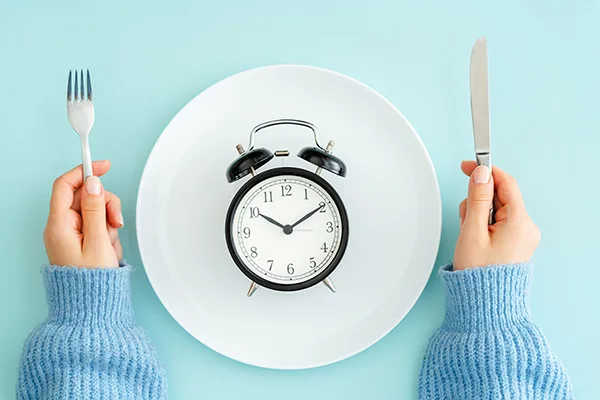You may have already heard about intermittent fasting, where you fast for a period of time each day to help with weight loss.
Now, research from the University of Alabama Birmingham has found eating your dinner at, well, lunchtime can help you lose weight and keep it off. It’s called early time-restricted feeding (ETRF).
Sound a little crazy? Let’s unpack the findings…

The earlier you finish eating of a day could help with weight loss.
(Image: Getty)How does it work?
During the study, researchers examined 11 women and men between the ages of 20 and 45.
They took part in two different feeding trials over a four-day period. The first group ate three meals over a 12-hour timeframe, and the second group consumed three meals over a six-hour period – breakfast at 8am, lunch at 10am and dinner at midday. Both groups ate the same amount of food.
To measure how many calories, carbohydrates, protein and fat each participant had burned across the trials, they were then put in a respiratory chamber, which measured their metabolisms.
The researchers found that the second group (shorter eating window) had an increased fat burning rate because their body was able to switch from using food for fuel to fat for fuel.
“Your blood sugar control is best in the morning, particularly the mid-morning, so that’s why we think you may get extra benefit by eating early, to be in sync with those natural circadian rhythms,” says Dr Courtney Peterson, the study’s co-author.

Eating breakfast at 8am, lunch at 10am and dinner at midday (we know it sounds mad!) was found to increase the fat burning rate of study participants.
(Image: Getty)The pros
Dietitian and nutritionist Susie Burrell says the health benefits for this kind of relatively easy-to-follow eating regimen include “reduced blood pressure and cholesterol”.
In terms of seeing a difference on the scales, Susie explains you can expect to see “some weight loss – around one to two kilos a month”.
This form of eating is also great because it doesn’t restrict your calorie intake the way in which other diets might.
“You do of course need to be eating healthy meals with plenty of protein, vegies and a serve or two of wholegrains,” adds Susie.
The cons
Perhaps the most obvious difficulty with ETRF is the period of time you have to wait between dinner and breakfast again the following day – around 20 hours if going by the study findings.
“This aspect can be challenging for some people,” says Susie. “This diet is also not suited to those with high energy demands, pregnant or breastfeeding women, anyone with insulin resistance or diabetes.”
Always speak to your GP before changing your diet.
.jpg?resize=380%2C285)
